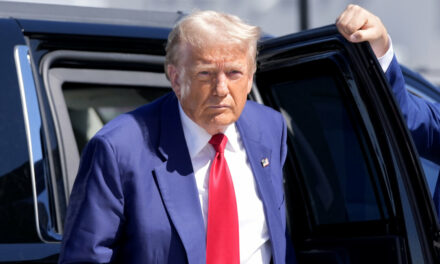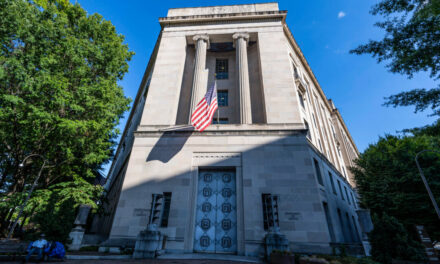We support our Publishers and Content Creators. You can view this story on their website by CLICKING HERE.
On third anniversary of Afghanistan withdrawal, former president pays homage at Arlington.
Former President Donald Trump laid wreaths at the Tomb of the Unknown Soldier in Arlington National Cemetery on Monday, while President Joe Biden and Vice President Kamala Harris issued statements to mark the third anniversary of the United States’ withdrawal from Afghanistan.
Thirteen U.S. service members—11 Marines, one Navy corpsman, and one soldier—were among more than 170 people killed in a terrorist bombing at Abbey Gate outside Kabul’s Hamid Karzai International Airport on Aug. 26, 2021.
Joined by family members of some of the fallen, the former president laid a wreath, paused solemnly for the bugler’s Taps, then returned to retrieve another wreath to lay again. He repeated the process three times.
Trump and his presidential campaign had spotlighted the pending anniversary for several weeks as an example of what he called the federal government’s “incompetence,” which set the stage for what unfolded that day.
The former president did not make any formal statements or comments at the ceremony or during his time at Arlington National Cemetery. His campaign staged an afternoon press call with several family members, vice presidential candidate Sen. JD Vance (R-Ohio), a Marine Corps veteran, and GOP congressional leaders, including Reps. Ryan Zinke (R-Mont.) and Derrick Van Orden (R-Wis.), Navy SEALS who served in the Iraq/Afghanistan wars.
Biden and Harris issued separate statements calling on the nation to “mourn and honor” the 13 who perished trying to rescue others. Both mentioned each service member by name.
He said the nation’s leaders now “owe their brothers and sisters-in-arms—who served and sacrificed for our freedom and future during America’s longest war. 20,744 American service members were wounded. 2,461 made the ultimate sacrifice” to make wise decisions.
Harris defended the administration’s action, saying that Biden “made the courageous and right decision to end America’s longest war.”
“Over the past three years, our Administration has demonstrated we can still eliminate terrorists, including the leaders of al-Qaeda and ISIS, without troops deployed into combat zones. I will never hesitate to take whatever action necessary to counter terrorist threats and protect the American people and the homeland.”
Congressional Republicans have criticized the withdrawal from Afghanistan that unfolded less than eight months after Biden took office in hearings for the last two years, laying responsibility for it on the Biden administration.
Democrats and the Biden administration have countered that the genesis of the calamity is the Trump administration’s February 2020 Doha Agreement with the Taliban, consenting to deplete and then totally withdraw U.S. forces by May 2021, a draw-down they say that fostered the rapid deterioration of the Afghan government and turned a planned, orderly departure into a retreat debacle.
“The decisions of both President Trump and President Biden to end the U.S. military mission in Afghanistan had serious consequences for the viability of the Afghan government and its security,” the report states in the first of 28 findings identifying mistakes made by administration officials, intelligence agencies, the Pentagon, and those within the State Department.

 Conservative
Conservative  Search
Search Trending
Trending Current News
Current News 







